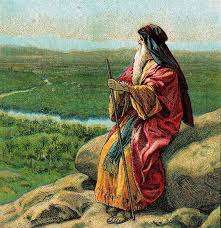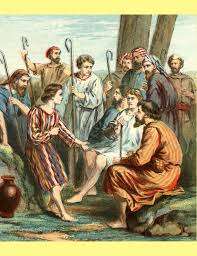

Settlement in the Land of Promise: By the People of God
Pr. Phinni Joseph
The Story begins with the great Ancestor Abraham when God spoke to him, "...Go from your country and your kindred and your father’s house to the land that I will show you" (Gen.12:l).This was crystallized in the exodus tradition as God spoke to Moses. "...and to bring them up out of the land to a good and broad land, a land flowing with milk and honey to the place of the Canaanites, the Hittites,the Amorites, the Perizzites, the Hivites and the Jebusites” (Ex.3:8). It is quite evident that in these texts the land was given as a blessing to the people of God under the Old covenant. The Ancestral tradition envisages the promise, the exodus tradition implies the preparatory measures to enter the Promised Land and the conquest and settlement tradition in the book of Joshua implies the realization of those promises. However, the later traditions point to the Judges and Monarchy concerned with the loss of land. No matter what happens in the later half of the story, the Old Testament tradition revolves around the theme of the land as part of the life and witness of the people of lsrael. The possession and inheritance of the Land of Promise became the key factor in the promise given to the people of Israel.
Possession and Inheritance of the Land
The Land of Promise is described as the 'nahala' (inheritance) derived from the verbal form “nahaI’ which means 'to inherit”. For the people of Israel it denotes an inheritance from God of Israel. lt makes them the rightful owners of the property. However, the ultimate and legitimate ownership of the land is retained with the Lord (Lev. 25:23).Though the land is given as a gift, it must be inherited by possession (ahuz-take possession). lt presupposes that the land was previously owned by someone else. lt was owned by the Canaanites, the Hittites, the Amorites, the Perizzites, the Hivites and the Jebusites. The promises of the land being given as the gift can only be realized by the taking possession of the land or claiming their inheritance (Num.27:6). lt is emphasized with greater significance that the land must be taken as inheritance by exercising force (yarash). Along with the aforesaid terms, it is also used and understood as to gain possession of the land as "go over the Jordan into the land" (Num.32:5), divide the land (Josh.13:7) and specifically 'dwell in the land’ (yashab) (Num.33:53) or settle in the land. Hence the purpose for which the land is taken as possession is 'to settle’ or’ to establish’ in it.
The Textual Study
There are two texts analyzed for the purpose of this study. Num.33:53 and Joshua 23.The first text can be structured as follows:
Num.33:53.
And you shall take possession of the land and settle in it.
For I have given the land to you to possess it.
The land is given as a promise from the Lord and the imperative for the people is to take possession of it. lt doesn’t end in mere possession, rather they need to settle or establish in the land. The implications of the possession and establishment in the land are explained with greater clarity in the book of Joshua chapter.23: 4-8. 23: 4 - The land is given as an inheritance
5 - The dispossession of the people of the land.
6 - Obedience to the Lord as necessary condition for the continued possession of the land.
The land of Canaan was chosen as the Promised Land for His people because of detestable practices of the people, like polytheism, child sacrifice, idolatry, religious prostitution and divination (Deut.18:9-11; Deut. 9:1-5, Lev. 18:9-15, 24-3O).The extermination of the people from their land is seen as the judgment of God. This land is given to the people of lsrael for settlement (Deut. 8:1ff, 9:1-5). The settlement of the people in the land has several implications to the land itself, to the faith and practices of Israel.
Transition from Nomadic to Settled Life
The ancestors of the people of Israel travelled from one place to another in search of food and pastures. In later years, the Israelites were in the wilderness living in tents without having permanent settlement. The people were given the description of the land flowing with milk and honey (Ex.1 3:5; 33:3; Lev. 20:24; Num.13:27).This would make them interested for a settled life. The Mosaic address of the people also anticipates this, “all the commandment which l command you this day you shall be careful to do, that you may live and multiply and go in to possess the land which the Lord swore to give to your fathers” (Deut.8:1).This implies building of fine houses, herds and flocks grow, increase of silver and gold. The land will be blessed with wheat and barley, olives and fig trees, pomegranates and olive oil. They cultivated for themselves and rose to the level of self sufficiency (Deut.8:12-13).They were no more destined to a wandering desert life, rather, to enjoy the produce of the land (Josh. 5:11).
Establishment of the True Worship
The settlement in the land specifically emphasized and demanded an extreme allegiance to the worship of Yahweh (Deut.6:4). Joshua says, "Therefore be very steadfast to keep and do all that is written in the book of the Law of Moses, turning aside from it neither to the right hand nor to the left, that you may not be mixed with these nations left here among you, or make mention of the name of their gods, or swear by them or serve them or bow down yourselves to them, but cleave to the Lord your God as you have done to this day”. This obedience and devotion to the only one true God makes the basic requirement for the continued possession and inheritance of the land. They are warned of any practice of idolatry or worship of foreign gods (cf. Deut.4:25-28; Ex.32:2-35; Deut.11:16-17).Any mistake made in relation to this would result in the dispossession of the land (Josh. 23:13).The people in that land were condemned because of their polytheistic worship. Hence, the lsraelites were required of their strict devotion and obedience to the only one true God that entitled them for the blessings of the land.
Cultural Purification
The people of lsrael were warned not to follow the detestable things of the nations of the land. They were prohibited from the shedding of innocent blood (Num.35:33-34), sexual perversions (Deut.22: 22), covetousness (Deut.20:15-17) and asked to practice righteousness and justice in the land (Deut.4:5-8). The Holiness Code (Lev. 17-26) makes it clear that the lsraelites living in the land must observe a life in accordance to the nature of God. They need to observe holiness in relation to their food habits (ch.17), marriage relationships (ch.18), behavior toward God and other human beings (ch.19). Especially the priests must maintain a higher standard of living in their life, offerings and sacrifices. They need to celebrate the festivals of Yahweh as an expression of their gratitude towards the Lord, in remembrance of the Lord's deeds on behalf of them and in anticipation of greater blessings. Even the land must be kept and utilized in accordance with the norms laid down in the Law. The Sabbatical and Jubilee years helps the people to keep the sanctity of the land. lt also gave freedom to the slaves and bonded laborers to enjoy the blessing of the kingdom where the King of lsrael, Yahweh reigns. That is to say, the cultural milieu of the nation is thoroughly modified along with the standards of the Only One True and Holy God of lsrael.
Divine Governance of the Land
The land conquered must be distributed in an equal manner. He also gave directions regarding the boundaries of the land (Num.34: 3-12). The nine and a half tribe of lsrael must receive their inheritance by lot in the Promised Land. Two and a half tribe of lsrael had already received their inheritance beyond Jordan. And also the Lord appointed men to divide the inheritance of the people of lsrael in the land of Canaan. Since Yahweh is the Owner of the land (Deut.25:23) He wanted to have a better administration of the land given to the people. It emphasizes the relative equality of possession that would make them economically viable and self sufficient. Along with this, Levitical cities are separated for the welfare and sustenance of the tribe who serves in the temple. From the larger tribes they should take many and from the smaller tribes they should take few, each in proportion to the inheritance, which means a fair distribution of the Land of Promise.
Committed Leadership
For the continued and effective possession of the land, good leadership is anticipated. lt was to the leadership that Joshua gave commandment, "Joshua summoned all Israel, their elders and heads, their judges and officers and said to them” (Josh.23:2; 24:1). Effective leadership plays a vital role in possession and settlement in the land. Joshua was also encouraged by the Lord, "be strong and of good courage; for you shall cause this people to inherit the land which l swore to their fathers to give them” (Josh.1:6). The Leadership must be characterized by their devotion and commitment to the Law of the Lord (Josh .l:8) Lack of such effective leadership caused the downfall of the nation in the latter years. The people walked according to their own ways, everyone did as he saw it fit in their own eyes (Judg.2l:25). When the leaders treated the people with contempt they lost their land and blessings from the Lord. The settlement of the people in the land heavily depended on the committed and effective leadership and their faithfulness to the Mosaic Covenant.
The possession and settlement in the Land of Promise has several implications to the land, faith and practice of the people of lsrael. The purpose of giving the Land of Promise is to bring forth a radical change to the existing systems prevalent in the land. That pervades all aspects of the existence of the people. lt is intended to establish and propagate the values and ethos of monotheistic faith, exclusive loyalty and devotion to the only One and True God. This would in turn result in a thorough cultural cleansing imparting the values of a better kingdom. lt is also aiming at the fair distribution of resources and blessings so that each individual in the community is benefited from it. Special provisions were made for the underprivileged and weak section of the society. For the people to possess, settle and enjoy the goodness of the land, to a larger extent depends on the commitment, character and courage of the leadership. Establishing implies efforts for something concrete: build, plant and produce. Work for establishment of the Worship of right kind, kingdom oriented cultural transformation, better governance and administration of the resources and committed leadership; for (the Lord) has given the Land to (the People of God) to Possess it!











